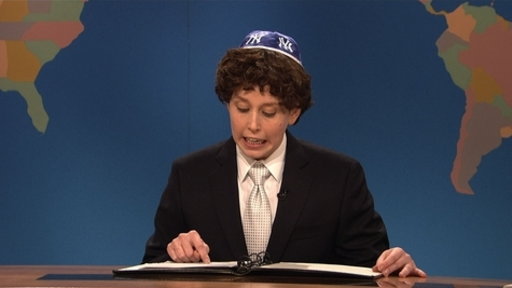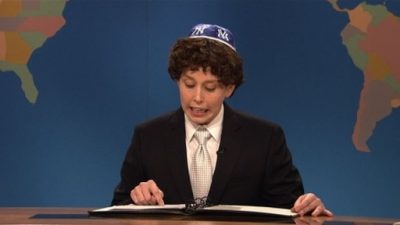What I have to say is controversial.
But bear with me, and let me first contextualize, with something I think we all can agree on.
The Jewish narrative is one of struggle. With me so far? Since the birth of the Jewish people, we have been outcasts. Expelled from our homes, exiled from our lands, hunted down, systematically sought out, massacred. Our history is one of pride and strength, of overcoming the odds, of desperate survival in the face of tragedy and cruelty. As a modern Jew, living in a secular world, I am proud of that culture, and feel a strong bond to others who I know share the same cultural memory. I would not be here, had my grandparents not been strong enough- and lucky enough- to survive the war and the Holocaust, and if their grandparents and great grandparents before them hadn’t survived pogroms, raids on their villages, wars and expulsions in their own times. These days, although my every day life in America does not exactly facilitate Jewish practice (and admittedly I could go out of my way a bit more to actively seek it), I can’t say I feel my Judaism is under attack.
Now let me be clear: anti-semitism is alive and well, visible in many a context. Although I’m not expected to wear a yellow star on my coat, America and the secular world- especially the Christian world I live in- make it clear that my tradition is not one I should expect to be considered in daily proceedings. In my experience, its been more of a simple de-prioritization than an actual threat; a clear statement that it is inconvenient to consider me. School dances will always be planned on Friday nights, pork hotdogs will always be served at soccer team barbecues. After three years of missing my school pictures because they were scheduled for Rosh Hashana, my mother had the audacity to complain to the superintendent; we were informed that after a long and troublesome process, they had been able to reschedule to ‘accommodate’ us. The date was moved to Yom Kippur.
I came to terms with this phenomenon long ago. It’s not that our superintendent hated me for being a Jew, rather that it simply had not occurred to him that it would be problematic. It was so cosmically not on his radar, that even when informed of the problem, he failed to integrate it into his considerations when rescheduling, and went out of his way to make it clear how much of an inconvenience we were.
Jews in the media are represented in an incredibly unflattering light, as well, one that frequently brings a humiliated heat to my cheeks in a movie theater. Any character portrayed as nerdy is not complete until they make a comment about their Bar Mitzvah- and don’t forget the ten-second flashback of their younger self, dancing the hora with ugly family members while loud klezmir music plays. Anyone neurotic and overly-knowledgeable in your favorite TV show probably has a last name like Goldstein, as well as braces and a bad sense of fashion. As a child I loved the musical Oliver! and only later in life noticed a few interesting facts about the main villan of the movie. He sports a white beard, a black brimmed hat, a long coat, and darts around fingering his many golden treasures to the tunes of clarinets playing in a minor scale, as he directs wide-eyed aryan children in the ways of greed and deception. Although he’s totally the best character in the movie, the realization that he was also supposed to be a Jew was a bit disappointing.
But these days, the Jewish narrative of struggle has two very different faces to it, on two different sides of the globe. As an American Jew, the biggest threats to my Jewish identity are these small irritations and frustrations; inconveniences that exclude or distance me. That has very little to do with being Jewish, and a lot to do with being a minority. American culture isn’t very interested in including Muslims, either, or portraying Asians flatteringly in the media. That’s just a part of living in America as a minority: expect to see some pretty appalling caricatures of yourself in the movie theater. There are other assumptions people make about me: I loathe the assumption that as an American Jew, I must be a right-wing zionist, as much as I hate the assumption that as a left-wing, liberal, young-person I must condemn and denounce all that Israel does, and sleep in pajamas printed with the Palestinian flag.
In Israel however, the narrative of victimhood, of struggle, has very different meaning. Here, the idea of “threat” is perceived a lot more practically, but, in my eyes, unnecessarily. Israel is essentially, an entire nation suffering from PTSD, and justifiably so. With all that the Jews have been through, no wonder the Jewish state is determined to protect itself. But right now, what are we protecting ourselves from? Last month’s Pillar of Defense operation proved just how capable we are of crushing any uprising in the occupied territories. Although rockets were falling on the South, not a single civillian who followed basic safety protocol was injured. The results in Gaza were devastating. I mean, devastating.
Israel is thoroughly protected by incredibly powerful allies, who have made it clear that Israel is on the map to stay. While the situation is complex, I do not believe that Israel is the player in the game that stands to lose the most.
So at this point, I don’t believe that Israel has a right to the victim card anymore. As of now, it has one of the strongest military forces in the entire world, backed pretty unconditionally by thestrongest military force in the entire world. The only way that Israel is under the threat of losing their Jewish statehood, is if they fail to create a two-state solution and must absorb the arab population of the West Bank and Gaza, and thereby lose a Jewish majority. Honestly, even if this is the outcome, I still won’t see Israel as the victim. The Palestinian Authority has again and again asked for their own state, and while they have also turned down several offers, the Israeli government’s failure to facilitate real ongoing negotiation- let alone action- on this topic, has landed them in the situation we are now in. Israel’s refusal to even communicate with Hamas- they currently only dialogue through Egypt- is incredibly aggravating for me. Although they are a terrorist organization and I understand Israel’s legitimate desire to distance themselves, like it or not, they are the opposing power, and if we truly seek a solution, we have to communicate. In fact, Bibi’s refusal to communicate is great news for Hamas, because it enables them to maintain their control over the Gaza strip. Pretending that they do not exist will not solve the problem, or ‘delegitimize’ them enough to destabilize their government, it merely stalls peace and demonstrates Israel’s lack of investment in negotiation or meaningful change.
In fact, I will go further. In my opinion, as a nation with such a turbulent past, we have a responsibility to ourselves to show the world what it means to be survivors. What good is it to come out of these horrific events, bearing the scars of humiliation, of violence and tragedy if we haven’t learned anything? How can we, as a people, look back on our history, and then turn around and target another population? Exodus 23:9, one of our holiest texts, says “You shall not oppress a stranger, since you yourselves know the feelings of a stranger, for you also were strangers in the land of Egypt.” Where has this sentiment gone?
Netenyahu, wake up! Right wingers, extremists, religious zealots, open your eyes! The real threat isn’t in Gaza. The real threat is inside every one of us. In becoming the oppressors, we have lost the very root of our tradition, and the fabric of our identity.


